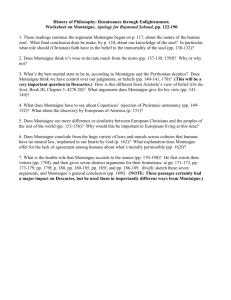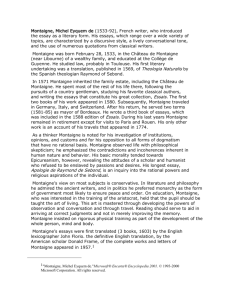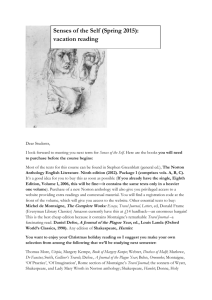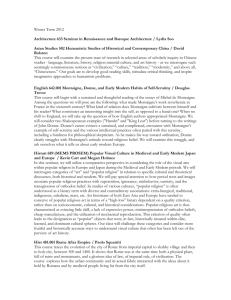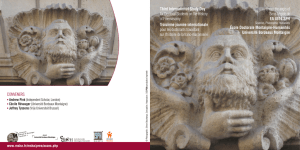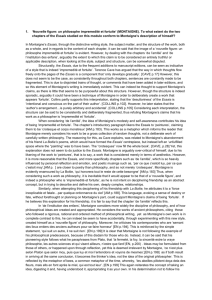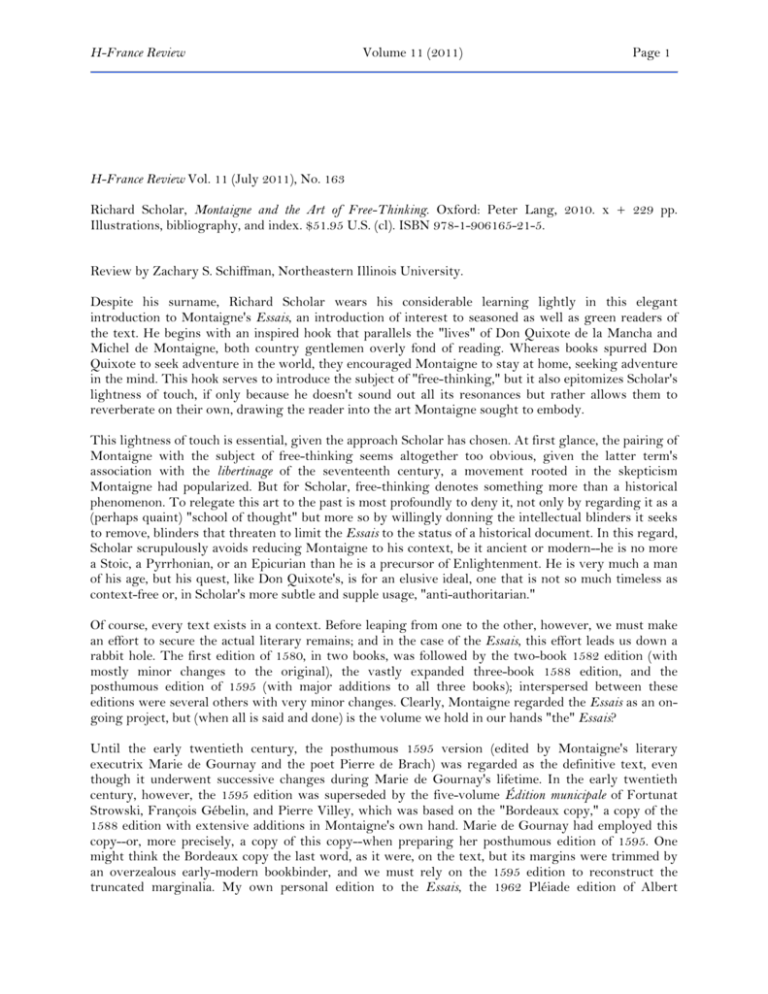
H-France Review
Volume 11 (2011)
Page 1
H-France Review Vol. 11 (July 2011), No. 163
Richard Scholar, Montaigne and the Art of Free-Thinking. Oxford: Peter Lang, 2010. x + 229 pp.
Illustrations, bibliography, and index. $51.95 U.S. (cl). ISBN 978-1-906165-21-5.
Review by Zachary S. Schiffman, Northeastern Illinois University.
Despite his surname, Richard Scholar wears his considerable learning lightly in this elegant
introduction to Montaigne's Essais, an introduction of interest to seasoned as well as green readers of
the text. He begins with an inspired hook that parallels the "lives" of Don Quixote de la Mancha and
Michel de Montaigne, both country gentlemen overly fond of reading. Whereas books spurred Don
Quixote to seek adventure in the world, they encouraged Montaigne to stay at home, seeking adventure
in the mind. This hook serves to introduce the subject of "free-thinking," but it also epitomizes Scholar's
lightness of touch, if only because he doesn't sound out all its resonances but rather allows them to
reverberate on their own, drawing the reader into the art Montaigne sought to embody.
This lightness of touch is essential, given the approach Scholar has chosen. At first glance, the pairing of
Montaigne with the subject of free-thinking seems altogether too obvious, given the latter term's
association with the libertinage of the seventeenth century, a movement rooted in the skepticism
Montaigne had popularized. But for Scholar, free-thinking denotes something more than a historical
phenomenon. To relegate this art to the past is most profoundly to deny it, not only by regarding it as a
(perhaps quaint) "school of thought" but more so by willingly donning the intellectual blinders it seeks
to remove, blinders that threaten to limit the Essais to the status of a historical document. In this regard,
Scholar scrupulously avoids reducing Montaigne to his context, be it ancient or modern--he is no more
a Stoic, a Pyrrhonian, or an Epicurian than he is a precursor of Enlightenment. He is very much a man
of his age, but his quest, like Don Quixote's, is for an elusive ideal, one that is not so much timeless as
context-free or, in Scholar's more subtle and supple usage, "anti-authoritarian."
Of course, every text exists in a context. Before leaping from one to the other, however, we must make
an effort to secure the actual literary remains; and in the case of the Essais, this effort leads us down a
rabbit hole. The first edition of 1580, in two books, was followed by the two-book 1582 edition (with
mostly minor changes to the original), the vastly expanded three-book 1588 edition, and the
posthumous edition of 1595 (with major additions to all three books); interspersed between these
editions were several others with very minor changes. Clearly, Montaigne regarded the Essais as an ongoing project, but (when all is said and done) is the volume we hold in our hands "the" Essais?
Until the early twentieth century, the posthumous 1595 version (edited by Montaigne's literary
executrix Marie de Gournay and the poet Pierre de Brach) was regarded as the definitive text, even
though it underwent successive changes during Marie de Gournay's lifetime. In the early twentieth
century, however, the 1595 edition was superseded by the five-volume Édition municipale of Fortunat
Strowski, François Gébelin, and Pierre Villey, which was based on the "Bordeaux copy," a copy of the
1588 edition with extensive additions in Montaigne's own hand. Marie de Gournay had employed this
copy--or, more precisely, a copy of this copy--when preparing her posthumous edition of 1595. One
might think the Bordeaux copy the last word, as it were, on the text, but its margins were trimmed by
an overzealous early-modern bookbinder, and we must rely on the 1595 edition to reconstruct the
truncated marginalia. My own personal edition to the Essais, the 1962 Pléiade edition of Albert
H-France Review
Volume 11 (2011)
Page 2
Thibaudet and Maurice Rat, is based on the Bordeaux copy, with lacunae filled in from the 1595 edition.
Unfortunately, in at least one instance, Marie de Gournay may have altered the order of Montaigne's
chapters, as well as changed his spelling and punctuation; although modern critical editions have
restored the order of the chapters to reflect Montaigne's (presumed) intentions, they have mostly
retained Marie de Gournay's orthography and punctuation. In his 1998 Imprimerie nationale edition,
however, André Tournon revised the standard version of the text, restoring the extensive changes
Montaigne had made to orthography and punctuation in the Bordeaux copy. The changes in
punctuation result in a dramatically different reading of the Essais--more clipped and segmented than
Montaigne's garrulous reputation would suggest--and the changes in orthography, especially the
capitalization of key terms and ideas, alters the substance as well as the style of the text. But even
Tournon made concessions to the modern reader that purists might object to, and both the 1595 edition
and the Édition municipale still retain their scholarly adherents, rendering the search for an "authentic"
text inconclusive.
The instability of the text complicates any attempt to establish a context, especially when one considers
that this context itself necessarily derives from a reading of other texts whose provenance may be even
more opaque than that of the Essais, a "work" blessed by greater good fortune than most (heedless
bookbinders notwithstanding). I have gone out of my way here to underscore a point about the relation
between text and context to which Scholar is extraordinarily sensitive (though he makes it in an
entirely different way), a point that shapes his whole approach to Montaigne's art of critical thinking.
The Essais do not so much "exemplify" or "represent" this art as put it to the test; they are (to borrow
an expression from Charles Taylor) "radically reflexive"; they force the reader to think about thinking,
and in so doing, they create a special space, bounded at either extreme by what Scholar terms "freedom"
and "constraint" (pp. 11-12). He identifies Montaigne's intellectual freedom with an anti-authoritarian
cast of mind, but he acknowledges that, for Montaigne, intellectual freedom depends upon constraints-habits, customs, laws, beliefs--without which it cannot function. Free thinking is the mind's art of
navigating between these rocks, upon which it can too easily founder, with freedom becoming license
and constraint narrow-mindedness. One can best understand this art not by reducing it to its historical
context but by following its actual course in the Essais.
Scholar begins his analysis of the text, disarmingly enough, with Montaigne's preface, "To the Reader."
Here Montaigne epitomizes the art of free thinking when he openly and unconventionally declares, "I
am myself the matter of my book," while regretting that the custom of wearing clothes constrains him
from presenting himself entirely naked. Such is the difficulty of navigating between freedom and
constraint, though, that one preface—one pitch to the reader—won't suffice to explain this art, so
Montaigne reiterates it in the prefaces, apostrophes, and dedications that recur throughout the first two
books, literary moves that serve to reintroduce the reader to an art that is itself open-ended, that circles
back upon itself again and again. Especially noteworthy is Scholar's analysis of the early chapter, "Of
idleness" (1.8), which constitutes for all practical purposes a second preface. Here Montaigne regrets
that in the freedom of retirement, his mind has taken license, like a runaway horse that he now seeks to
constrain by putting its fantasies into writing (les mettre en rolle), hoping thereby to make his mind
"ashamed of itself." The necessity of registering his thoughts suggests (as Scholar duly notes) that
Montaigne regards his mind has having a mind of its own, which he will pursue endlessly, bridle in
hand.
The famous chapter "Of the education of children" (1.26) addresses the art of free thinking directly, not
only by enunciating it as a principle but (as always) by embodying it. Scholar begins his analysis of this
chapter with an extended discussion of the term "free thinking” and its relation to the term "context."
The almost instinctive identification of free thinking with early modern libertinage indicates that "The
history of free thinking is always a contextual history" (p. 45), and Scholar elaborates no fewer than six
interrelated contexts for the traditional history of free thinking. Most of these, however, refer to a post-
H-France Review
Volume 11 (2011)
Page 3
Tridentine struggle between science and religion, between faith and reason, which did not fully engage
Montaigne. To properly understand his place in the history of free thinking, Scholar concludes, "we
need to keep turning to the text [of the Essais] itself, to the twists and turns of its sentences" (p. 52). By
unraveling the skein of Montaigne's argument in "Of the education of children," Scholar reveals how
free thinking emerges as the interplay of three elements: (1) one's freedom to reject the authority of
one's teachers; (2) one's practice of doubting as a means of searching for truth; and (3) one's reliance in
this search on the words and ideas of others, which one internalizes and makes one's own. Lest this
chapter itself become an authoritative pronouncement on education, Montaigne writes with such
beguiling self-deprecation that the reader naturally discounts his authority while internalizing his
words.
From "Of the education of children" Scholar moves on to consider another famous chapter, "Of
Democritus and Heraclitus" (1.50), where Montaigne explores what he means by "essaying" his
judgment. Although Scholar's textual itinerary is predictable, his approach to this well-worn theme is
entirely fresh. He begins by carefully establishing that the chapter "Of Democritus and Heraclitus" is
less "an essay"--a notion that smacks too much of our modern usage of the term--than a textual space
where essaying occurs, a space where Montaigne engages in innumerable, free-wheeling "thought
experiments" (p. 72). Scholar emphasizes the open-ended nature of these experiments by examining the
history of the text of the Essais, which Montaigne progressively expanded and glossed, resulting in the
three major editions of 1580, 1588, and 1595. Rather than end his historical account of the text here,
however, Scholar goes on to consider the various editions based upon the Bordeaux copy, and the
debates between adherents to the different modern editions of the text, by way of illustrating how the
text itself remains as open-ended as the process of thinking it encourages.
In an ironically entitled chapter, "Two Cheers for Free-Thinking," Scholar moves on (predictably) to
consider the "Apology for Raymond Sebond," with (again) unpredictable results. The most interesting
part of Scholar's analysis turns on his reading of an apostrophe, where Montaigne addresses a warning
to "the princess"--presumably Margaret of Valois--about the double-edged nature of the skeptical
arguments he is about to deploy. Scholar reveals how the course of the argument in this apostrophe
follows an S-shaped curve, as Montaigne swings sharply from embracing skeptical methods, to rejecting
them as dangerous, to accepting them with caution. The movement of thought within this apostrophe
mirrors the "sinuous" movement of the chapter as a whole, where Montaigne reveals himself, not so
much as a skeptic, but as someone willing to use the methods of skepticism in a prolonged search for
truth, as someone who combines a sense of freedom and constraint. This "fine balance," as Scholar terms
it, is difficult to achieve. Although Montaigne portrays himself as an Everyman, his art is not for
everyone. Hence it gets only two cheers.
From the "Apology," which sits at the center of the Essais as a whole, Scholar moves on to consider the
central chapter of Book Two, "Of freedom of conscience" (2.19), whose symbolic position is further
accentuated by its title, the only chapter title in the text to employ the word liberté. Scholar's analysis of
this chapter reveals it as Montaigne's invitation to the reader to "attempt to think with freedom about
freedom of conscience" (p. 114). This exercise turns on the reader's ability to consider Montaigne's
judgments and come to his or her own conclusions, in an open and free essaying that constitutes the
true nature of friendship. Free-thinking thus lies at the heart of an ideal association that extends
between Montaigne and his contemporaries, between himself and past figures, and between himself and
future readers, whose earnest and honest engagement he welcomes.
Scholar's argument culminates in his penultimate chapter, "Of Keeping Your Freedom Alive," which
channels Montaigne's spirit in both form and substance. Here Scholar begins by analyzing "Of
husbanding your will" (3.10), where Montaigne shows how he has kept his judgment free in a partisan
age of religious/civil war. Just as Montaigne extols freedom of judgment by means of examples both
H-France Review
Volume 11 (2011)
Page 4
ancient and modern, so too Scholar moves back and forth through time with a Montaignian ease. He
segues from Montaigne's assessment of the legendary hero, Marcus Manlius, who defended the Rome's
Capitol Hill against the Gauls, to Montaigne's actual visit to Rome in 1581, where he encountered the
censors of the Index of Prohibited Books. Although they had some bones to pick with the 1580 edition
of the Essais, they declined to make specific recommendations, deferring (fittingly enough) to
Montaigne's judgment. And this he exercised, in the few places where he actually addressed their
objections, by showing how the art of free-thinking dwells between freedom and constraint. In these
exercises of his judgment, Montaigne remained exquisitely aware that "his present is the past of the
future in which he hopes to be read" (p. 178), and this observation brings Scholar back to the chapter at
hand ("Of husbanding your will") and Montaigne's clever use of pronouns, in which he contrasts
"them"—the narrow-minded—against "us," those who still read Montaigne in the spirit in which he
wrote, namely, the would-be Sancho Panzas ready to accompany him on his quest.
Zachary S. Schiffman
Northeastern Illinois University
z-schiffman@neiu.edu
Copyright © 2011 by the Society for French Historical Studies, all rights reserved. The Society for
French Historical Studies permits the electronic distribution of individual reviews for nonprofit
educational purposes, provided that full and accurate credit is given to the author, the date of
publication, and the location of the review on the H-France website. The Society for French Historical
Studies reserves the right to withdraw the license for edistribution/republication of individual reviews
at any time and for any specific case. Neither bulk redistribution/ republication in electronic form of
more than five percent of the contents of H-France Review nor re-publication of any amount in print
form will be permitted without permission. For any other proposed uses, contact the Editor-in-Chief of
H-France. The views posted on H-France Review are not necessarily the views of the Society for
French Historical Studies.
ISSN 1553-9172

